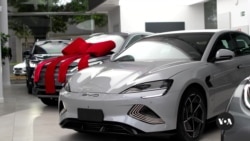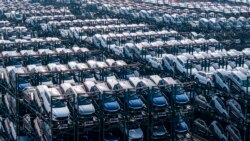ຜູ້ຜະລິດລົດຂອງຈີນ ກໍາລັງວາງເດີມພັນ ກັບລົດໄຟຟ້າເພື່ອເຂົ້າມາຕັ້ງຫຼັກໃນຕະຫລາດລົດຂອງບຣາຊີລ, ເຊິ່ງໃຫຍ່ເປັນອັນດັບ 6 ຂອງໂລກ. BYD ແລະ GWM, ເຊິ່ງເປັນສອງຜູ້ຜະລິດລາຍໃຫຍ່ທີ່ສຸດຂອງຈີນ, ທີ່ກໍາລັງລົງທຶນປະມານ 2.5 ຕື້ໂດລາສະຫະລັດ ເພື່ອເລີ່ມຕົ້ນການຜະລິດ ໃນປະເທດ. ຢານ ໂບຊາດ (Yan Boechat) ລາຍງານຈາກ ຊາວ ເປົາໂລ (Sao Paulo), ເຊິ່ງອາດນະສັກມີລາຍລະອຽດມາສະເໜີທ່ານ.
ຜູ້ຜະລິດລົດຂອງຈີນ ກໍາລັງເຮັດໃຫ້ມີການຫຼັງໄຫຼຂອງລົດໄຟຟ້າ ເຂົ້າໄປໃນຕະ ຫຼາດລົດຂອງບຣາຊີລ, ເຊິ່ງແຕ່ກ່ອນຖືກຄອບງໍາໂດຍບັນດາບໍລິສັດອາເມຣິກາ, ຢູໂຣບ, ແລະຍີ່ປຸ່ນ.
BYD ແລະ GWM, ສອງຜູ້ຜະລິດລົດໄຟຟ້າ ທີ່ໃຫຍ່ທີ່ສຸດຂອງຈີນ, ໄດ້ປະ ກາດການລົງທຶນຫຼາຍກວ່າ 2.5 ຕື້ໂດລາສະຫະລັດ ເພື່ອເລີ່ມຕົ້ນການຜະລິດໃນທ້ອງຖິ່ນໃນປະເທດບຣາຊິລ ໃນປີນີ້.
ທັງສອງບໍລິສັດ ຈະຫັນປ່ຽນໂຮງງານເກົ່າຂອງ ຟອດ (Ford) ແລະ ເມີຊີດີສ໌ (Mercedes), ທີ່ຫາກໍອອກຈາກປະເທດໄປ ເມື່ອບໍ່ດົນມານີ້.
ທ່ານ ຣີກາໂດ ບາສໂຕສ (Ricardo Bastos) ຜູ້ອໍານວຍການຝ່າຍກິດຈະ ການສະຖາບັນຂອງ GWM ບຣາຊີລ ກ່າວຕໍ່ພວກເຮົາເປັນພາສາອັງກິດວ່າ:
"ຍຸດທະສາດຂອງພວກເຮົາບໍ່ແມ່ນພຽງແຕ່ເພື່ອນໍາເຂົ້າລົດເທົ່ານັ້ນ. ພວກເຮົາ ໄດ້ເລີ່ມການນໍາເຂົ້າລົດໃນປີກາຍນີ້. ພວກເຮົາຈະສືບຕໍ່ການນໍາເຂົ້າອີກສອງສາມປີ. ຢ່າງໃດກໍຕາມ, ເລີ່ມຕັ້ງແຕ່ປີນີ້, ພວກເຮົາຈະເລີ່ມການຜະລິດໃນປະເທດບຣາຊີລ. ດັ່ງນັ້ນ, ຕະຫຼາດ ບຣາຊີລ ຈຶ່ງເປັນຍຸດທະສາດທີ່ສຳຄັນຫຼາຍສໍາລັບ GWM ໃນຖານະເປັນສ່ວນນຶ່ງຂອງຕະຫຼາດ, ແຕ່ ບຣາຊີລ ຍັງຈະເປັນຖານສໍາລັບການສົ່ງອອກ ໃນອາເມຣິກາລາຕິນ ອີກດ້ວຍ."
ບໍລິສັດຈີນມີ ຍອດຂາຍສູງສຸດເປັນປະຫວັດສາດ ໃນປະເທດບຣາຊີລ ໃນປີ 2023, ໂດຍນຳການນໍາສະເໜີລົດໄຟຟ້າ ແລະ ລົດແບບຈັກປະສົມທີ່ລຽບງ່າຍກວ່າ ແລະ ລາຄາບໍ່ແພງ ເມື່ອປຽບທຽບກັບຄູ່ແຂ່ງຈາກຍີ່ປຸ່ນ ແລະ ຢູໂຣບ.
ສະມາຄົມລົດໄຟຟ້າຂອງບຣາຊີລ ກ່າວວ່າຍອດຂາຍໃນກຸ່ມນີ້ ໄດ້ເພີ່ມຂຶ້ນຫຼາຍກວ່າ 90 ເປີເຊັນ ໂດຍສະເລ່ຍ ໃນປີ 2023, ເມື່ອທຽບໃສ່ປີກ່ອນ.
ທ່ານ ບາສໂຕສ (Bastos), ຊຶ່ງຍັງເປັນປະທານສະມາຄົມ ອີກດ້ວຍ ເຊື່ອວ່າຕະຫຼາດບຣາຊີລ ຈະສືບຕໍ່ຂະຫຍາຍຕົວໃນປີນີ້, ໂດຍທ່ານໄດ້ກ່າວຕື່ມວ່າ:
"ປີທີ່ຜ່ານມາແມ່ນດີຫຼາຍ. ປີນີ້, ພວກເຮົາຄາດຄະເນ ຍອດຂາຍໃຫມ່ ໃນບຣາຊີລ. ດັ່ງນັ້ນ, ພວກເຮົາຈຶ່ງຄາດວ່າຈະຂາຍໄດ້ປະມານ 150,000 ຫົວຫນ່ວຍໃນ ບຣາຊີລ ໃນປີນີ້, ກໍຄືໃນປີ 2024."
ປະເທດບຣາຊິນເປັນຕະຫຼາດລົດທີ່ໃຫຍ່ອັນດັບ 6 ຂອງໂລກ, ໂດຍມີຍອດຂາຍລົດຫຼາຍກວ່າ 2 ລ້ານຄັນ ໃນປະເທດ ໃນປີ 2023, ອີງຕາມຂໍ້ມູນຂອງສະມາ ຄົມຜູ້ຜະລິດລົດແຫ່ງຊາດ.
ລົດໄຟຟ້າ ແລະລົດແບບຈັກປະສົມ ຍັງເປັນສ່ວນນ້ອຍໆຂອງຕະຫຼາດນີ້, ທີ່ກວມເອົາປະມານ 5 ເປີເຊັນ, ແຕ່ໄດ້ມີການຂະຫຍາຍຕົວຢ່າງຕໍ່ເນື່ອງໃນຊ່ວງຊຸມປີທີ່ຜ່ານມາ.
ເຖິງແມ່ນວ່າຈະມີການຂະຫຍາຍຕົວ, ແຕ່ນັກວິເຄາະບາງຄົນກ່າວວ່າ ບຣາຊີລ ບໍ່ຈໍາເປັນຕ້ອງປ່ຽນຍານພາຫະນະຂອງຕົນເປັນ ລົດໄຟຟ້າ ຫຼື ລົດອີວີ (EVs) ແລະ ເວົ້າວ່າ ມີທາງເລືອກອື່ນທີ່ໃຊ້ງານໄດ້ແທ້ຫຼາຍກວ່າ. ພວກເຂົາເຈົ້າກ່າວວ່າ ລົດເກືອບທັງໝົດຢູ່ເທິງຖະໜົນຫົນທາງໃນປະເທດບຣາຊິລ ສາມາດຂັບເຄື່ອນດ້ວຍນໍ້າມັນເຊື້ອໄຟ ທີ່ປ່ອຍອາຍພິດຕໍ່າ ຊຶ່ງທີ່ບໍ່ຈຳເປັນຕ້ອງມີການປ່ຽນ ແປງພື້ນຖານໂຄງລ່າງ ເຊັ່ນ: ການຕິດຕັ້ງສະຖານີສາກໄຟ.
ທ່ານ ມີລາດ ກາລູມາ ເນໂຕ (Milad Kaluma Neto) ເປັນຜູ້ຊີ້ນໍາຫ້ອງການໃນບຣາຊິລຂອງ ເຈໂຕ ໄດນາມິກສ໌ (Jato Dynamics), ຊື່ງເປັນບໍລິສັດທີ່ປຶກສາດ້ານອຸດສາຫະກໍາຍານພາຫະນະອັດຊະລີຍະໄດ້ກ່າວເປັນພາສາອັງກິດວ່າ:
"ພວກເຮົາມີ ເອທານອລ (ethanol). ພວກເຮົາຍັງມີການພັດທະນາພາຍໃນບາງຢ່າງ ໂດຍໃຊ້ ໄຮໂດຣເຈນ (hydrogen) ເປັນຕົ້ນ. ດັ່ງນັ້ນ, ພວກເຮົາມີສະພາບການແບບນີ້ ໃນປະເທດບຣາຊິລ ທີ່ສາມາດຖືກນໍາໄປໃຊ້ໃນໄລຍະຍາວໆໄດ້, ທີ່ດີກວ່າລົດໄຟຟ້າ ພຽງຢ່າງດຽວ."
ໃນອາທິດທໍາອິດຂອງປີ, ສອງຜູ້ຜະລິດລົດລາຍໃຫຍ່ທີ່ສຸດ ໃນປະເທດບຣາຊິລ ຍັງໄດ້ປະກາດການລົງທຶນໃຫມ່ ມູນຄ່າຫຼາຍຕື້ໂດລາ.
ໂວກສວາເກນ (Volkswagen) ຂອງເຢຍຣະມັນ ປະກາດວ່າ ຕົນຈະອັດສີດເງິນ 1.8 ຕື້ໂດລາ ເພື່ອປັບປຸງໂຮງງານຂອງຕົນ ໃຫ້ທັນສະໄຫມ ແລະ ເລີ້ມການຜະລິດລົດແບບຈັກປະສົມ ຫຼື ຮາຍບຣີດ ແລະລົດໄຟຟ້າເຕັມຮູບແບບ ໃນປະເທດບຣາຊິລ. ບໍລິສັດ General Motors ຍັງໄດ້ໃຫ້ຄຳໝັ້ນສັນຍາວ່າ ຈະລົງທຶນ 1.4 ຕື້ ໃສ່ສູນການຜະລິດຂອງຕົນ ໃນປະເທດບຣາຊິລ ແຕ່ບໍ່ມີການປະກາດແຜນການໃຫມ່ ທີ່ຈະເລີ່ມ ການຜະລິດຍານພາຫະນະໄຟຟ້າໃນປະເທດ.
ອ່ານລາຍງານນີ້ເປັນພາສາອັງກິດຂ້າງລຸ່ມນີ້:
Chinese automakers are betting on electric cars to gain a foothold in the Brazilian automobile market, the sixth largest in the world. BYD and GWM, two of the largest Chinese manufacturers, are investing about US$ 2.5 billion to start production in the country. Yan Boechat reports from Sao Paulo.
Chinese car manufacturers are getting an influx of electric cars into the Brazilian automobile market, traditionally dominated by American, European, and Japanese companies.
BYD and GWM, two of the largest producers of Chinese electric cars, have announced investments of over US$ 2.5 billion to start local production in Brazil this year.
Both companies will transform former factories of Ford and Mercedes, which recently exited the country.
Ricardo Bastos is Director of Institutional Affairs at GWM Brazil said in English:
"Our strategy is not only to import vehicles. We started importing vehicles last year. We will continue importing for a couple more years. However, starting this year, we will commence production in Brazil. So, the Brazilian market is very strategic for GWM as a part of the market, but also Brazil will be the base for exports in Latin America."
Chinese companies had a record sales year in Brazil in 2023, offering simpler and more affordable electric and hybrid vehicles than their Japanese and European competitors.
The Brazilian Association of Electric Vehicles says sales in this segment grew by more 90% on average in 2023, compared to the year before.
Bastos, who is also the president of the association, believes that the Brazilian market will continue to expand this year.
Ricardo Bastos, GWM Brazil:
"So last year was amazing. This year, we are forecasting new record sales in Brazil. So we are expecting around 150,000 units sold in Brazil this year, 2024.”
Brazil is the sixth-largest car market in the world, with more than two million cars sold in the country in 2023, according to the National Association of Car Manufacturers.
Electric and hybrid vehicles still represent a small portion of this market, accounting for about 5%, but have grown steadily in recent years.
Despite the growth, some analysts say that Brazil doesn't need to convert its fleet to EVs and [say] other, more practical options are available. They say nearly all the cars on the roads in Brazil can be powered with low-emissions fuels that require no infrastructure changes, like the installation of charging stations.
Milad Kaluma Neto directs the Brazil office of Jato Dynamics, an automotive industry intelligence consultancy said in English:
"So, we have ethanol. We also have some internal developments using hydrogen, for example. So, we have this kind of situation here in Brazil that it could be applied for a long, long term, much better than only electric vehicles.”
In the first weeks of the year, two of the biggest carmakers in Brazil also announced billions of dollars in new investments.
Germany’s Volkswagen announced it is pumping $1.8 billion to modernize its facilities and start the production of hybrid and fully electric cars in Brazil. General Motors also promised to invest 1.4 billion in its production complex in Brazil but announced no new plans to start production of electric vehicles in the country.







ຟໍຣັມສະແດງຄວາມຄິດເຫັນ